How to Search for People in a Building if You Dont Know Nayone
Someone is looking for you online – and they're probably going to discover yous. The web is full of websites and services that provide your details to others.
It's an uncomfortable sensation to know that your personal information can exist used to track yous. While information technology is unlikely anyone who has Googled you would intend harm, it is useful to know who they are.
It might be a potential employer, former lover, or even a long-lost relative. But how would you know if someone is searching for you on the cyberspace? Here are the v nearly likely ways people accept of finding you.
Who Is Searching for Me Online?
Wondering how sites like MyLife know who is searching for you? They don't. If y'all're concerned that someone might be looking for yous, there is sadly no fashion of knowing who they are.
In most cases, however, you probably have a good idea. Friendly faces will probably plow up via Facebook. Others, yet, are likely to discover another way.
While it's not possible to reveal who they are, you can at least apply the same tools they're using. So, while you tin't see who has Googled y'all, you tin prepare alerts whenever your name appears on a website, in a forum, or on social networks.
From there, you should exist able to trace the message back to the original poster and find out who they are.
ane. Who Has Googled You lot? Use Google Alerts
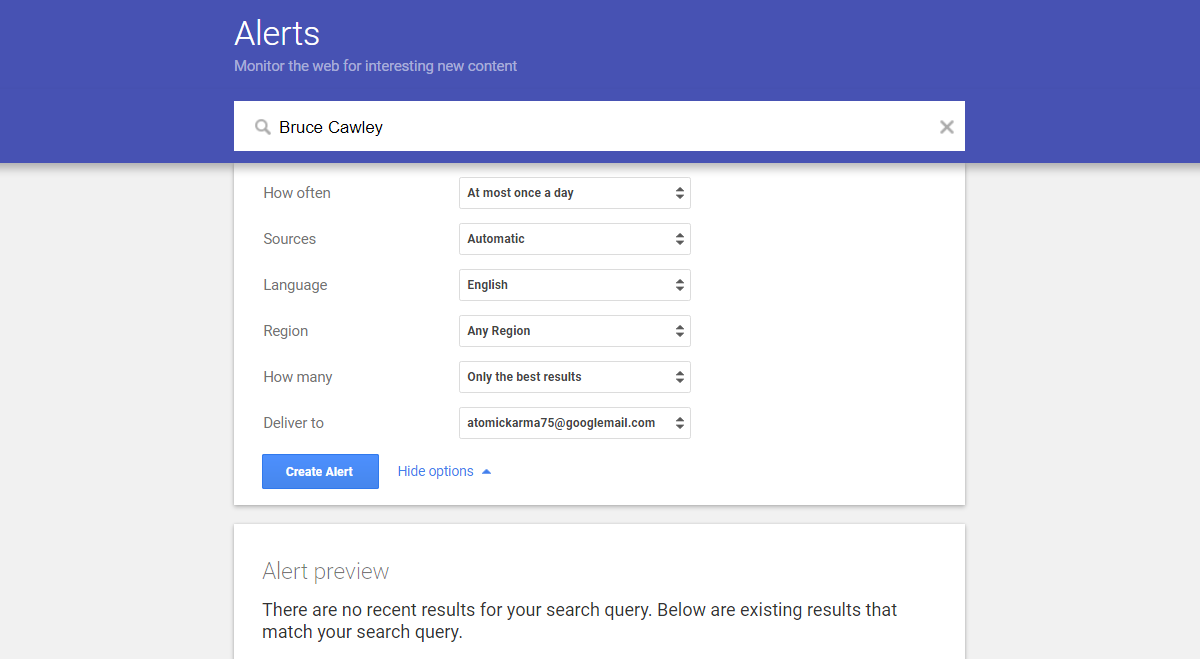
Yous might be asking yourself, "Who Googled me?" The outset thing to do is to set up a Google alert. Information technology might seem somewhat self-absorbed, but this is genuinely the kickoff footstep in playing it safe.
Merely don't tell anyone you've got an alert for your own proper noun on Google Alerts…
Sign in to Google and visit google.com/alerts. Here, enter your name in the warning box at the top of the page and click Create Alert.
Employ the Show Options link to expand the view. This lets you set how often email alerts will make it and where they should be delivered. You'll see a preview of your alerts also, to give you lot an idea of how they will look.
Information technology won't tell you lot how many times your name has been Googled, but whenever Google spots your name on a website, news page, social media, forum, or weblog mail, information technology volition send you an email alert!
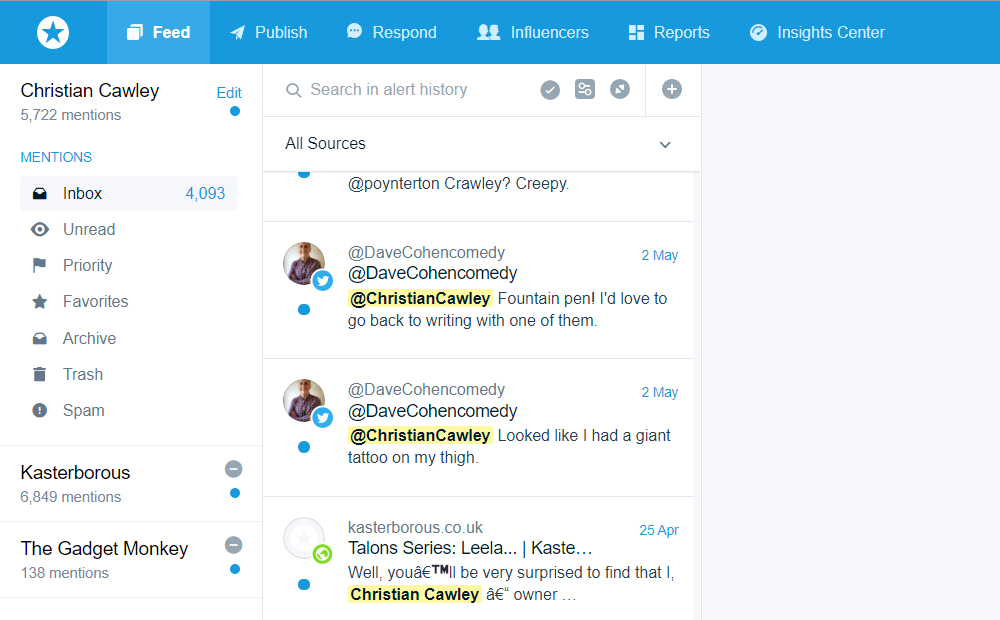
Like Google Alerts, only focusing on social networks that might run across mention of your name is Mention.com.
This is a web-based warning organization that offers apps for Windows 10 and macOS, equally well as Android and iPhone. Sign up is gratuitous for the standard service, while Mention besides offers a fourteen-day trial of the fully featured service. Once you sign upward, sign in and create an alarm. You can choose up to four additional alerts, which in this case might be the names of close family members.
Click Get Started to proceed. Mention will start scanning sources, including blogs, forums and social networks like Facebook and Twitter. A default selection of sources is scanned initially; click the Edit alert push button in the Mention dashboard to edit this.
The Mention dashboard lists all occurrences of your alert, which by default is sent to your email inbox. When an electronic mail is received, click the notification to instantly observe out what context your proper name has been used in.
Is someone looking for you?
3. Set up a LinkedIn Profile
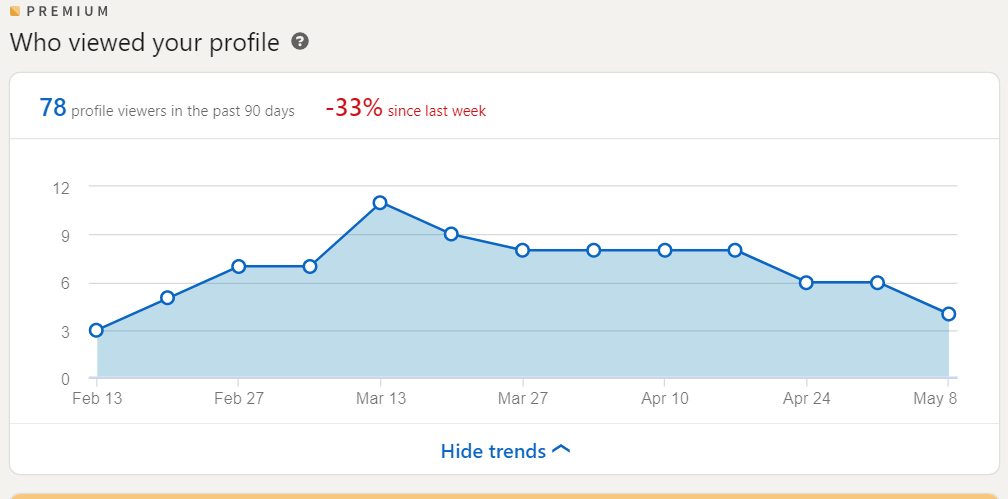
A LinkedIn profile is incredibly useful for finding a new chore. You lot might be a freelancer, an expert in your field or if you're simply looking for a change of career.
However, a presence on LinkedIn means that y'all can be found. Signing in to the service will brandish a full of profile views for the current menstruum. LinkedIn Premium members will run into full details of those viewing them; the gratis account holders will only see a handful.
LinkedIn will display your profile views with the following data:
- Proper noun
- Profile movie
- Job part
- Company/Business name
- Connectedness type
- Time since they viewed your profile
If someone is using LinkedIn to track you lot downwardly, at that place is a good chance that it is for piece of work-related reasons. On the other hand, yous might like to know simply who is looking, and why. Using the LinkedIn Premium service is a good way to become a handle on this. Unlike other options, it volition display who has searched for you as long equally they are a LinkedIn fellow member.
4. Check Facebook Interactions to Acquire Who Is Looking for You
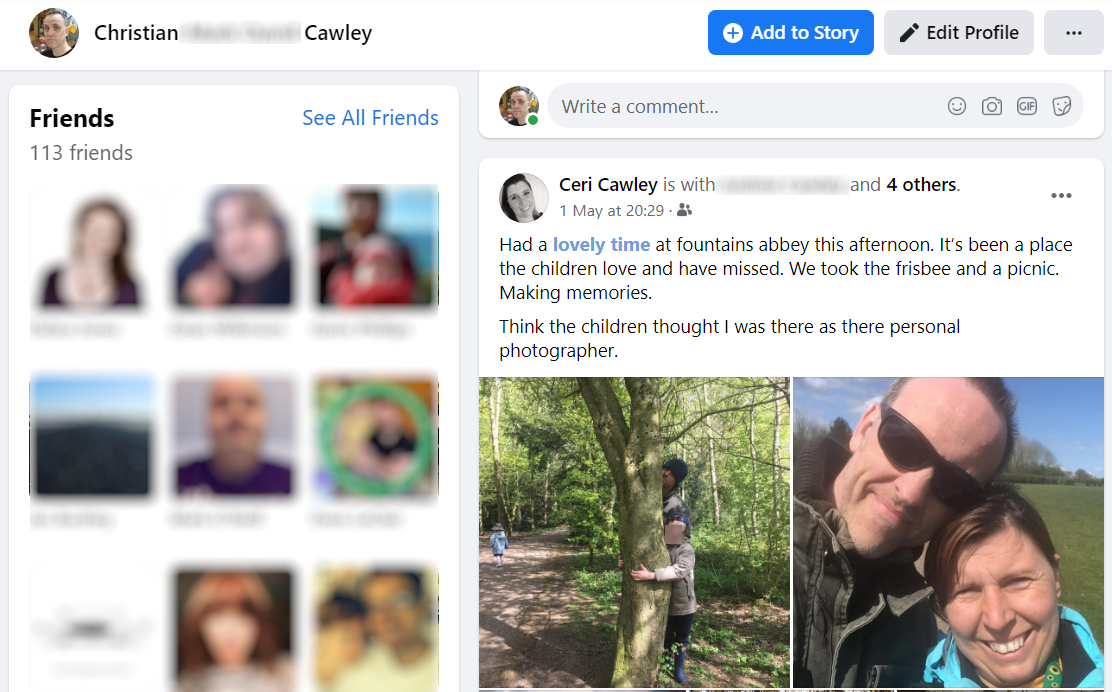
Facebook doesn't tell you who has viewed your profile, correct? Well, that's half correct. While there is no obvious, explicit fashion to spot who has checked you, Facebook does provide some clues.
Facebook'southward algorithm for displaying which of your friends has viewed your profile is as unknown as the 1 that suggests new contacts. Nevertheless, elements similar photograph tagging, profile views, and which contacts are online are all believed to impact who is displayed.
While imprecise, yous tin can at least discern which contacts are interested in looking for yous online.
Meanwhile, if you use the Facebook Story characteristic, you tin check who has viewed the post. After posting a story and waiting for information technology to collect a few views, open up the story post and click the eye icon. This volition list the names of the friends and other connections who viewed the mail. Sadly, it tin't tell you how many times your proper name been searched on Facebook.
5. Learn Who Is Searching for Yous With Twitter Analytics
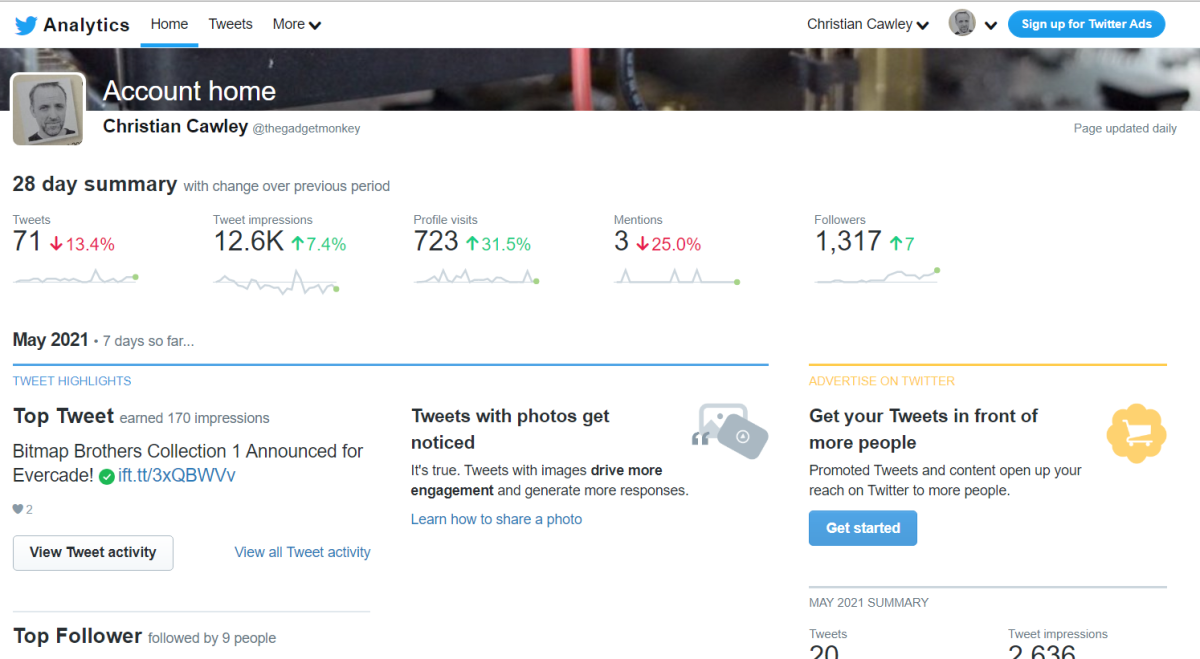
You can likewise go in-depth on Twitter to find out who is looking for you lot online. You probably already know that you can cheque the usernames of people who like or retweet your posts. Unless they accept their account locked or hidden, those interactions are recorded for you to check.
But what about beyond that? Other interactions, such as people searching for you or browsing your record of tweets are not recorded. Withal, you can utilize the Twitter Analytics screen (More > Analytics) to acquire more. This displays your tiptop tweets and tiptop followers. While not hugely revealing, it might be useful to spot a follower you were otherwise unaware of – perhaps an indicator of someone who is searching for you online.
6. Is Long Lost Family Searching for You?
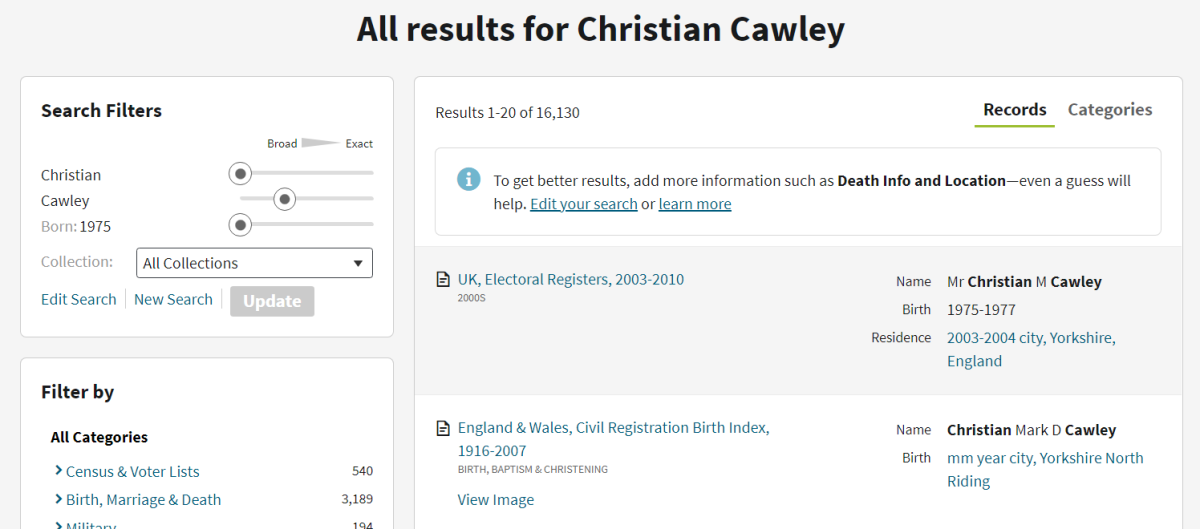
Mawkish long-lost family reunions are Idiot box ratings golden. They're too often responsible for people trying to track down afar (or estranged) relatives for a reunion after many years. Various websites exist that can be used to track yous and your family downward nether the auspices of "family inquiry".
For example, adoption search sites (such every bit www.adopted.com) can exist used to trace yous, or your remote siblings. While no adoption agency would allow contact with individuals without permission, registering with one of these sites involves submitting consent.
Meanwhile, genealogy research behemoth world wide web.ancestry.com has a vast database that could theoretically be used to track your current whereabouts.
Sadly, similar many of the tools we've mentioned here, Ancestry can be misused. Every bit an Ancestry member y'all receive notification if y'all have been added to other family copse. However, you cannot tell if anyone has checked yours or your ancestors' details. It is possible to put a lock on your tape, nonetheless, to forestall access by unrelated parties.
7. Obituaries and Expiry Notices
Interestingly, a death and subsequent proclamation can show people where you are. Too busy being expressionless to care?
What if it was the passing of a loved one? Your mention in their obituary or decease notice in the local press, replicated for the online edition, could place a large "I am here" find over your head. There are many people who share names, common and uncommon. Mayhap it won't thing. But it'south worth taking care. After all, this information might be the last piece in the puzzle for someone trying to rail you downwards.
It'south worth considering that the announcement of births and marriages in the press tin can also alert people to your location.
Utilise Alerts and Stay Aware!
People are ever looking for yous, exist it friends, family, fifty-fifty fans. On the other manus, it might be debt collectors, potential employers, or even criminals.
There is no way to know who searched for you, and so the smart pick is to manage all interest in y'all. Several options are open to people trying to find you:
- Google search
- People finding websites like PeekYou
- Social networks like Facebook, Twitter, and Instagram
- Professional networking tools such as LinkedIn
- Public record and genealogy sites
- Obituary and expiry notices of relatives
Meanwhile, if y'all're looking for someone online, all yous demand to practise is follow a few simple steps. If the person you lot're looking for is online, yous'll probably detect them.
Nearly The Author
Source: https://www.makeuseof.com/tag/x-easy-ways-find-looking-online/

0 Response to "How to Search for People in a Building if You Dont Know Nayone"
Post a Comment